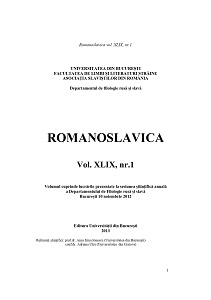Contribuţia scriitorilor ruşi la dezvoltarea pedagogiei
The Contribution of Russian Writers to the Development of Pedagogy
Author(s): Aura HapenciucSubject(s): Russian Literature, History of Education, State/Government and Education, Sociology of Education, Philosophy of Education, Pedagogy
Published by: Editura Universităţii din Bucureşti
Keywords: pedagogy; early modern period; modern period; postmodern period; reform; pedagogical thought; pedagogical conception; culture; historical dimension; writer; education; educational system;
Summary/Abstract: The paper The Contribution of Russian Writers to the Development of Pedagogy emphasizes the involvement of Russian writers in social life, their connection to the history of social thought and of education. The purpose of this paper is to highlight the national identity of Russian pedagogy, the originality of its historical destiny. The specific role of Russian writers in the development of pedagogy is explained by the awareness of a certain prophetic mission that the Russians have. The intellectual contribution and the social involvement of many Russian writers, like Michail Lomonosov, A.N. Radishcev, N.I. Novicov, K.D. Ushinsky, N.G. Tchernyshevsky, L.N. Tolstoy, A.S. Makarenko, V.A. Suhomlinsky, is considerable. For example, the Soviet writer and educator A.S. Makarenko developed the theory and methodology of team education and the theory of family education, K.D. Ushinsky is the founder of the scientific pedagogy in Russia, the novelist L.N. Tolstoy developed the idea of free education, the publicist and writer V.A. Suhomlinsky made an important contribution to the theory and practice of humanistic education. We have to remark that man is a cultural being and pedagogy is a science of culture that communicates with the great works of human culture. Considering the fact that the term "paideia" is used with the meaning of “education”, but also with a wider and deeper meaning, regarding the "culture of the spirit" it is understandable why artists have excelled in the field of pedagogy.
Journal: Romanoslavica
- Issue Year: XLIX/2013
- Issue No: 1
- Page Range: 95-102
- Page Count: 8
- Language: Romanian

